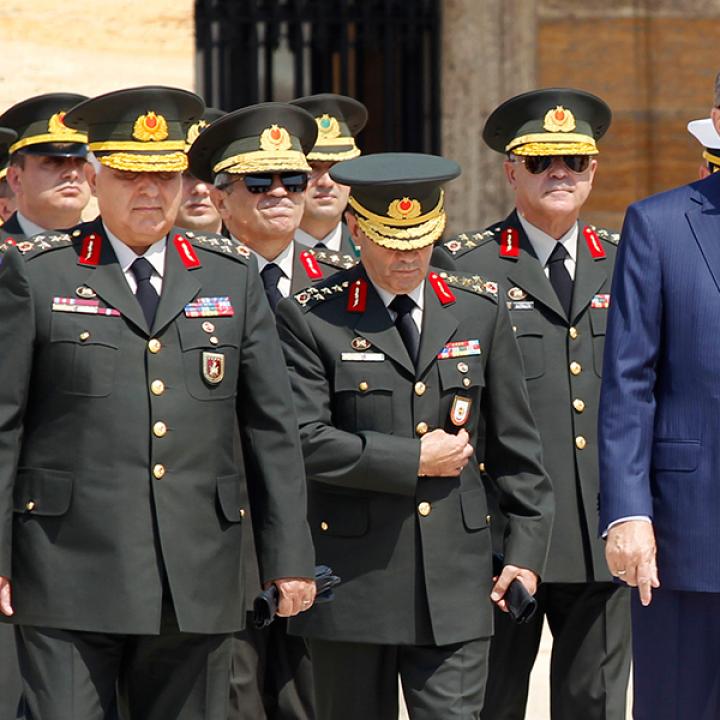
- Policy Analysis
- PolicyWatch 2121
Turkey's Ergenekon Convictions: Impact on U.S. Relations

The United States has serious business to do with Turkey, all of which remains doable despite the troublesome verdicts against top military officials.
Earlier this month, a large number of senior Turkish military officers, including former chief of staff Gen. Ilker Basbug, were convicted of plotting a coup against the government in the so-called "Ergenekon" case. The outcome has shocked many observers inside and outside Turkey, particularly the harsh life sentence given to Basbug, which spurred President Abdullah Gul to say he was "saddened" by the court's decision. While hardly a call to action, Gul's comment reflects a sentiment held by many -- that the conduct of the trial is open to question. Regardless of whether the convictions are appealed, the case has already left its mark on Turkey's domestic political landscape and could affect relations with the United States as well.
WHAT DO THE VERDICTS MEAN?
The trial can be looked at from several perspectives, all at least partially correct. Some would depict it as a democratic government, supported by much of the population, deciding to rein in a military that had long assumed the right to move against elected leaders whom it believed were violating the secularist principles of the republic's founder, Mustafa Kemal Ataturk. In that sense, the political process behind the trial was necessary and successful. On another level, however, the way in which the proceedings were carried out -- closed to the press, hearsay evidence permitted, defendants' rights limited -- underlines the sad state of the often arbitrary and opaque Turkish judicial system. And on yet another level, the government may have used its powers in consort with the flawed judiciary to persecute not just coup plotters, but the military in general.
While there is no credible evidence to document the latter accusation, the trial results raise questions about Turkey's direction -- especially coming on the heels of mass protests at home and recent setbacks in Ankara's policy abroad. Is Turkey a reliable political, diplomatic, and security partner for Washington? Or might it come unglued in the near future?
The short answer is that Turkey will not fall apart, nor will it cease being an important regional partner. But the trial is likely to affect the bilateral relationship in subtle ways. Although the Turkish military will continue to function admirably, the prosecution and humiliation -- deserved or not -- of some of the country's most respected officers will undoubtedly alter morale throughout the armed forces. And that is of concern to Washington. Encouraging the military to respect civilian leadership and the choice of the people is a good thing. But causing officers to fear arbitrary state action at any time is not so good, particularly if it makes them reluctant to challenge the government on professional matters in which the military should have a voice.
Mutual trust between the U.S. and Turkish militaries will surely continue, but the verdicts raise warning signs. While Washington has dealt primarily with Turkey's civilian leadership over the years as is appropriate, U.S. military leaders have also found the Turkish military to be an effective channel for passing along security needs and ideas, just as in other NATO countries. Yet Turkey's military is now less able to play such a self-confident, independent role, nor may it want to -- after all, dealing openly with American and other NATO commanders might be seen as suspicious. Even if Ankara does not oppose such contacts, officers might still engage in nervous self-censorship given the Ergenekon verdicts.
Such problems will also likely affect the military's openness to U.S. ideas on weapons purchases, joint activities related to Syria and Iran, and cooperation with Israel. Although the Turkish military was never a completely unfiltered conduit for U.S. policy suggestions, its reservoir of professional training and shared experiences have long promoted American-style approaches to practical security problems. That reservoir remains, but many Turkish officers closely associated with the United States are likely disappointed that Washington could not do more to ensure fair treatment for their leaders during the trial. In some circles, General Basbug's fall might be seen in the same light as that of ousted Egyptian president Hosni Mubarak, another "friend of America" now behind bars. That comparison is unfair, but loyalty to one's friends is a central virtue in the Middle East, and Turkey is at least partially a Middle Eastern state.
U.S. POLICY RECOMMENDATIONS
Given this situation, what should Washington do? First, it should not panic. The convictions could still be overturned, the judicial deficiencies could be scrutinized and remedied, and the military may yet retain a central voice in Turkey's security policy. Accordingly, the United States should continue its broad and deep relations with the uniformed military, including its huge International Military Education and Training (IMET) program. And as always, it should continue to press for support of U.S. interests (e.g., purchase of American weapons; missile defense cooperation against Iran) while redoubling efforts to meet Turkey's legitimate defense needs, especially along the Syrian and Iraqi borders. In doing so, U.S. officials must respect the situation in which their Turkish uniformed friends find themselves -- with their leadership judicially decapitated -- rather than dwelling on this uncomfortable situation.
Above all, U.S. civilian and military officials should not in any way interfere in this properly domestic Turkish issue. Not only would such interference be unwelcome, it would also be counterproductive, undercutting whatever chance Turkey has of resolving this dilemma on its own. In particular, it would encourage Turkish military personnel to believe the United States can fix what is beyond its power, while provoking the civilian leadership in Ankara to respond to Washington seemingly taking sides against it. The United States has serious business to do with Turkey, all of which remains doable despite the troublesome Ergenekon verdicts.
James F. Jeffrey is the Philip Solondz Distinguished Visiting Fellow at The Washington Institute and former U.S. ambassador to Turkey.



